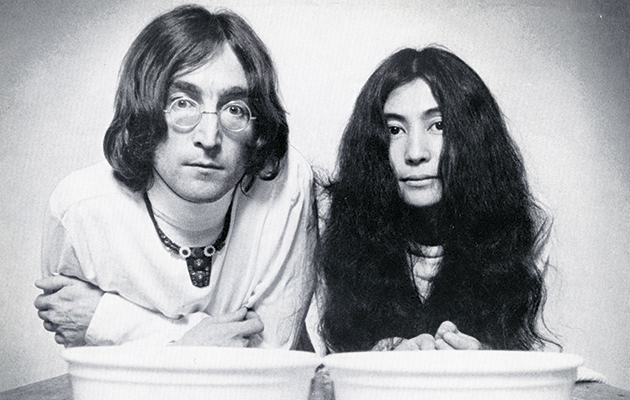The attic of his Kenwood home was one of John Lennon’s favourite places. Here, in his home studio, surrounded by tape recorders, cameras and instruments, he wrote songs, rattled off old rock’n’roll favourites and goofed around, creating soundscapes and trawling up Goons-like voices from his 19...
The attic of his Kenwood home was one of John Lennon’s favourite places. Here, in his home studio, surrounded by tape recorders, cameras and instruments, he wrote songs, rattled off old rock’n’roll favourites and goofed around, creating soundscapes and trawling up Goons-like voices from his 1950s childhood. Today the resultant tapes are on YouTube, but back then very few people got to hear his work in progress.
Inviting Yoko Ono to share this private world was, then, no small step. The two hardly knew each other, but Ono’s avant-garde, conceptual art had intrigued Lennon. He got it. With Lennon’s wife, Cynthia, away on holiday, the coast was clear for an artistic encounter, perhaps something more intimate.
Two Virgins is the soundtrack to that giddy, flirtatious night in May 1968, one consummated at dawn, the event celebrated with a selfie of the two lovers, naked and tousled. By the time of its release six months later, John and Yoko had become an inseparable item, and one disruptive of the fragile equilibrium of The Beatles. Two Virgins was, for many, a step too far. Its 30 minutes of ‘Unfinished Music’ was little more than indulgent clowning with tape loops, improvised guitar and Ono’s wailing and shrieking. Worse still was Lennon’s insistence on the naked cover shot, which offended the hierarchy of EMI at home and Capitol in the US, neither of which would issue the record. Eventually distributors were found and the cover discreetly wrapped for the shops. Even so, 30,000 copies for the US market were temporarily impounded.
Two Virgins isn’t a great record (“A bum album,” quipped Ono later), but it was central to building the mythology of John’n’Yoko and it can be enjoyed as a peek into their private world, a sample of their personal chemistry. It also illustrates the way that avant-garde ideas were seeping into the Beatles output (they had already borrowed from Karlheinz Stockhausen). And the offending cover is, inevitably, now considered iconic.
Although Ono was reviled by sections of the press and public as an Oriental witch who was busting up The Beatles – this canard would endure – for Lennon she was a liberating force. No longer was he shackled by Beatledom; he was an artist! He always had been! With Yoko he could put on exhibitions (Be Here Now for example), make films (Smile, Rape) and experiment. “Our love is our art,” declared Lennon.
It was a troubled phase in the couple’s lives, nonetheless. A drugs bust didn’t help. More distressing still was Yoko’s difficult pregnancy, which led to a miscarriage. The cover of Unfinished Music 2: Life With The Lions shows an exhausted Yoko in bed at London’s Queen Charlotte Hospital while Lennon hunkers beside her. Lennon looped a snatch of their unborn child’s heartbeat into a five-minute piece, followed by two minutes of silence, a homage to John Cage that was also an epitaph to their lost child. “Radio Play” is John fooling with a radio, dial turning and switch-snapping to no great effect, while “No Bed For Beatle John” has the couple incanting press comments on the pair.
More arresting is “Cambridge”, a live recording from The Natural Music Festival in that city in March 1969, with Lennon allying his guitar and howls of feedback with Ono’s trademark mix of wails, screams and groans. It was Lennon’s first public performance outside The Beatles, and you can sense the relish he took in it. Also on this extended reissue is “Mulberry”, with Ono reciting the title to Lennon’s acoustic guitar, and “Song For John” (aka “Let’s Go On Flying”) with Ono slipping between the delicate poetic lyrics of three unformed songs.
If the title of Life With the Lions was a nod to the couple’s difficult public life (and a pun on Life With The Lyons, a radio serial from Lennon’s boyhood), the couple’s private pain burst out on the John Lennon/Plastic Ono Band and Yoko Ono/Plastic Ono Band albums simultaneously released in late 1970. Lennon’s album is justly acclaimed as the best of his post-Beatles work, an unfettered cry of anguish following the couple undertaking Arthur Janov’s ‘Primal’ therapy. Ono’s album was inevitably but unjustly overshadowed. After all, it has the same musicians behind her, and Lennon, Ringo Starr and Klaus Voormann are all on magnificent form, a minimalist, muscular trio striking a relentless groove over which Ono lets rip with a series of weird wails and screams.
It can wear thin – four minutes into opener “Why” Ringo hits a splash cymbal as if to signal, ‘That’s Enough’ – but “Greenfield Morning/I Pushed an Empty Baby Carriage over The City” is eerie and harrowing, using a George Harrison sitar drone for its backdrop. Then there’s “Open Your Box” in a version that would be superceded shortly afterwards by a lyrically explicit take for the B-side of “Power To The People”, and “AOS”, an almost fragile duet with free jazz saxophonist Ornette Coleman from early 1968, but which folds tidily into the album’s mood.
Just as Lennon learned from Ono’s free-form conceptualism, so she would learn from his rock’n’roll genius to compose more structured, lyrical songs. Plastic Ono Band is, however, a very bold first step towards her later works.



